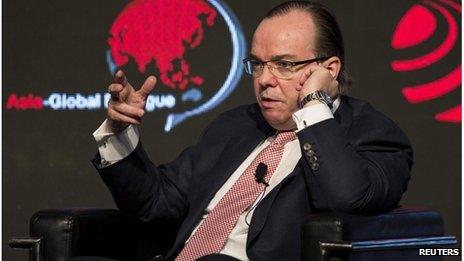Bankers limit EU pay curb
- Published
- comments

HSBC will top up chief executive Stuart Gulliver's fixed pay allowance
HSBC is the first big UK bank to explain in detail how it intends to get round the new European Union prohibition on big bonuses and continue to pay its top people many millions of pounds each.
There are two ways of seeing its plans: either as sticking two fingers up to Brussels, in a way that maybe is not appropriate for such a big and important institution; or as demonstrating the madness of the EU's attempt to curb local behaviour, in this case the pay of bankers, in businesses which have to compete in a global market.
Stuart Gulliver's fixed pay rise
The background is that a new EU law, known as CRD IV, prohibits variable pay - usually referred to as bonuses - greater than 100% of base salary, or 200% with the approval of shareholders.
Which means that as of next year, the pay policies of HSBC - and most other European headquartered banks - would be illegal, without reform.
For example, HSBC's chief executive, Stuart Gulliver, earned £5.5m in an annual incentive and what HSBC calls its Group Performance Share Scheme (GPSS) in 2013.
That is 4.4 times Mr Gulliver's base salary of £1.25m, so considerably more in variable pay than he would be allowed under the EU constraint (and, for what it's worth, Mr Gulliver earned £8m in total, including benefits and pension contribution of £1.2m).
In fact, Mr Gulliver could have earned even more in variable pay, £6.75m or 5.4 times his base pay, if he had hit all targets.
However, as of the current financial year, Mr Gulliver will only be able to earn a maximum of £2.5m from his annual incentive and GPSS (you are probably thinking, "poor lambykin").
So HSBC will top him up with what it calls a "fixed pay allowance" of £1.7m, paid in quarterly lumps.
In other words, his maximum remuneration is falling from £6.75m last year - excluding benefits and pension contribution - to a maximum of just under £5.5m. And given that he is unlikely to get the maximum in variable pay, perhaps he will earn £5m.
A pay cut?
Which looks like a chunky pay cut.
But his fixed pay, what is guaranteed to him, is rising from £1.25m to £3m. And most people would say guaranteed pay is more valuable and desirable for the receiver than performance-related variable pay, although it is usually thought of as less desirable by the proprietor of a business.
Any bank, for example, will lend rather more to someone whose income is fixed than to one whose income varies.
So Mr Gulliver - and the hundreds of other HSBC bankers who will see a portion of their bonuses and variable pay converted into this new fixed pay allowance - will not be on their uppers.
What are the broader consequences of this remuneration reconstruction?
Well, HSBC will have a clunkier pay system, but hopes it won't see its more able people deserting to American, Swiss or Asian banks that don't operate within the same remuneration constraints.
Is there a social and political consequence? Does it matter that HSBC - and the other big banks - will be seen as responding to a new law by coming up with a ruse that many will see as dodging it?
The banks will say they have the UK regulator and UK government on their side, since both have said they disapprove of the new EU bonus limit.
However, the law is the law, as they say. There are many laws that millions of people find irksome, but follow in letter and spirit.
So if HSBC and other banks are seen to be gaily skipping around an EU law they dislike, it may not do a good deal either for their popularity or for the majesty and authority of Brussels.